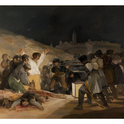I’m glad the “noughties” are over. It was a terrible name for a decade - far too redolent of a post-ironic Cool Britannia hangover. But as every newspaper and magazine in town is brimming with "best of" lists, all attempting to sum up the zeitgeist of the last ten years, our infatuation with thinking in decades seems to have reached an all-time high. Why?
In part, this is surely due to our increasing need for “historical housekeeping.” Measuring our lives and experience of history in tens injects a reassuring element of control and order over an otherwise inchoate experience. It feels historically comforting to say that something is quintessentially “1930s” (though try to unpick what that means and you’re soon in choppy water). Modern life may be an atomised experience, but at least we can still cling to the bold and unyielding decade to measure out our fractured existence.
Without wanting to sound too Sesame Street-ish about it, there is an appealing unity and perfection to the number ten. We describe flawlessness as a “perfect ten.” But breaking up time into such proscriptive chunks may be both politically and culturally hazardous.
For example, it may give an electorate artificially high expectations of how much real change a government can achieve within a term (or two) in office. The social and cultural effects that any government can introduce are slow and hard won, and notoriously hard to measure. The long-term impact of Thatcher and her ethos on British society is still endlessly debated, even though Thatcherism is now otherwise synonymous with the 1980s. So we are bound then to be disappointed and frustrated by what a decade will deliver in terms of social change or progress. If you can’t tangibly change society within ten years, then you’ve failed—next!
Ironically, decadal thinking, however reassuring we find it, is fractured thinking too. Culturally, at least, it tends to separate and divide historical understanding, and so restrict what we can learn from our past mistakes: if decades are of any use to us it is in how we understand their liminality and the way they bleed unpredictably into each another. For instance, the "noughties" proper didn't start on 1st January 2000, but arguably on 11th September 2001.
Decadal thinking forces us to define “things” categorically within an unyielding time frame, and thereby see the essential differences between generations rather than the similarities and overlap. In our love of categorising all things new and dissimilar, surely we forget that valuable cliché: plus ça change, plus c'est la même chose.













